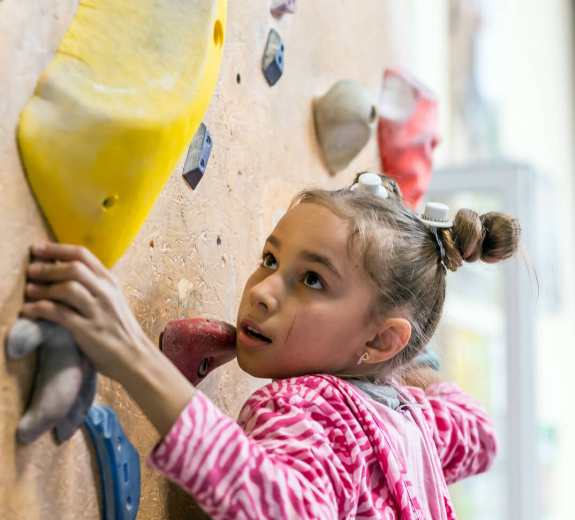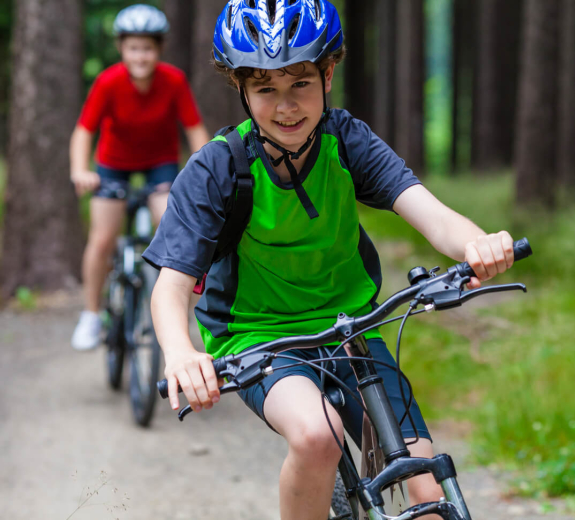We can thank the Evergreen Mountain Bike Alliance for two new parks devoted to the sport. These parks offer varied courses full of twists, turns, bumps and jumps, separated into novice, intermediate and advanced areas. (Helmets strongly encouraged; full-face helmets advised for tricky areas.) Kids and adults both will enjoy the four-acre I-5 Colonnade Mountain Bike Skills Park in Seattle, and 6-acre Duthie Hill Mountain Bike Park on the Issaquah Plateau. Skills and safety classes for kids ages 8 to 13 are occasionally held at Colonnade and other locations. Keep Evergreen’s week-long mountain bike Youth Dirt Camps (ages 9 to 13) in mind for next summer, for kids ready to use their intermediate level skills.

Exercising Outside the Box: Unique Activities for Kids
Exercise can be beneficial for children living with an autoimmune disease. It helps to regulate blood sugar, helps increase mental alertness and feelings of well-being. The key is gradual and gentle, without overdoing muscle fatigue and increasing pain.
Here is a list of activities to help children (and adults) explore more exercises that fit their abilities and energy levels. Some may be new to you (orienteering, parkour) and others are newly popular (yoga, ballroom dance). Before starting a new excercise routine, please discuss it with your healthcare provider.
Yoga
Yoga increases flexibility, strength, balance and coordination. Studies also show that yoga helps children relax and focus, and may help boost school performance. This is not surprising: yoga is noncompetitive and meant to be a nurturing experience.
Some classes for younger kids mix games and songs with age and developmentally appropriate yoga poses. For a roundup of Puget Sound venues and classes for children, see Red Tricycle magazine’s recent article.
Before signing up your child or teen, check whether the instructor is registered with the Yoga Alliance. This certification requires at least 200 hours of training in yoga techniques and teaching.
Ballroom dancing
It’s not just waltz, cha cha and swing anymore. Zumba and hip hop are among the dance forms with more “attitude” taught today. Several venues in the region offer classes for children as young as age 5, and some start kids dancing individually in a group instead of partnering as boy and girl. You might want to take a group or individual lesson yourself while your child is in class!
Dancing is good exercise and improves balance and coordination. Your child will develop body awareness and a sense of rhythm, too. And don’t forget that instructors stress politeness and respect for others. That’s another lesson your child can take with him or her on and off the dance floor. Just enter “ballroom dancing for children” in your Web browser to look at programs in your area.
Gym climbing and outdoor climbing walls
Kids are natural climbers because they have a high strength to weight ratio. And because climbing uses legs and abdominal muscles as well as the upper body, children get a full workout. But climbing is more than a physical challenge. It takes imagination to work through which holds to grab and where to place a foot.
Climbing develops balance and body awareness, too, as well as the ability to focus and persevere on the way to the top. Perhaps the best thing about climbing? Because it’s equal parts creative thinking and physical stamina, less athletic kids often shine.
Indoor rock climbing gyms typically offer kids’ classes and equipment. The Seattle REI Climbing Pinnacle is a 65-foot indoor structure providing several climbing options and year-round classes for kids. Several area parks have small climbing walls on their grounds including Saint Edward State Park.
Parkour
Would your children love to vault railings, climb short walls, swing through confined spaces, and balance on small objects, one right after the other? They’re too young to compete on American Ninja Warrior, but they can try parkour. Parkour is the art of overcoming obstacles as swiftly and efficiently as possible.
Parkour is great fun and a physical workout. It also develops agility, spatial awareness, balance, and the ability to focus and think in the moment. Courses are specially designed for the sport and often set indoors. Parkour instructors emphasize safety and injury prevention. They teach the correct way to crawl, fall, roll, run, land, jump, climb, and swing.
Seattle nonprofit organization Parkour Visions offers classes for kids in several age groups, age 3 and up. The first class is free.
Orienteering: the navigation sport
Orienteering involves racing against a clock and navigating an outdoor course with a special map. The goal is to find the pre-set checkpoints in order, but it’s up to each participant to determine the best route. Straight up the hill and through the trees? Or take the flatter but longer trail around the obstacle? This exercises your child’s mind and body while building self-confidence.
The nonprofit Cascade Orienteering Club holds meets year-round throughout greater Puget Sound. Its affiliated School League is open to students from elementary through high school and offers a free introductory class. Your child doesn’t need previous experience and belonging to a team isn’t required. Courses are separated by age, skill level and gender to provide the right degree of challenge. To give your child a feel for the sport, try one of the permanent orienteering courses located in Puget Sound parks. These beginner-level courses can be done anytime by groups or families.
Note: Exercise can be beneficial for those with autoimmune conditions and should be thoroughly discussed with your healthcare provider.
Originally Published October 2016 by Virginia Mason Health & Wellness
Immuno-what? Hear the latest from BRI
Keep up to date on our latest research, new clinical trials and exciting publications.



